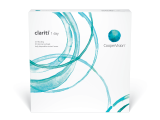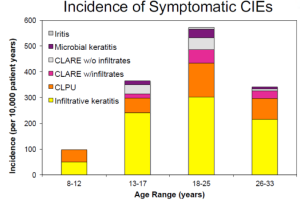Among CooperVision scientific posters and papers presented at the 2024 Global Specialty Lens Symposium (GSLS), one stood out for its application to a large segment of the U.S. population—children who are not receiving timely management of their refractive error and/or ocular disease.1
"Current Trends in Pediatric Eye Examinations and Contact Lens Prescribing in the U.S"1 (Kwan J., et al.) analyzed data from more than 70,000 pediatric eye examinations (children aged 0-17) to quantify the proportions of these patients undergoing vision screenings by age group; the prevalence of myopia, hyperopia, astigmatism, and pre-myopia; the proportions of pediatric patients prescribed contact lenses; and the distribution of contact lens categories prescribed.
The study found that the minority of children undergoing eye examinations are aged seven years or younger (14%), and that nearly half (43.5%) of children exhibit more than 0.50DS of myopia in at least one eye. In addition, about one in two children aged 5-12 potentially have pre-myopia (+0.50 to -0.25DS) in at least one eye.1 The retrospective review also found that eye care professionals (ECPs) rarely prescribed contact lenses to their pediatric patients—only 15% of children according to the data.
“The importance of early eye examinations in pediatric populations cannot be overstated, since they facilitate the timely detection and management of various visual impairments, including myopia,” said Justin Kwan, OD, FAAO, the paper’s lead author and Senior Manager, Myopia Management for CooperVision. “Our data underscores the need for early intervention strategies, and the significant underutilization of contact lens prescriptions by ECPs for pediatric patients.”
Now prescribed in more than 30 countries, CooperVision’s MiSight® 1 day is the first and only soft contact lens approved by the FDA* to slow the progression of myopia and correct vision in children aged 8-12 at the initiation of treatment.†2 The company also offers Paragon CRT orthokeratology for myopia management.
“Research efforts like these help ECPs deepen their clinical expertise and build confidence in evidence-based treatments,” said Francis Erard, CooperVision’s Vice President of Research and Development. “Our GSLS presence exemplifies a global commitment to advancing scientific research and its application toward comprehensive eye health improvements, including establishing myopia management as the standard of care. In partnership with ECPs worldwide, we are helping to shape the future of optometry and ophthalmology.”
Held annually, the Global Specialty Lens Symposium attracts nearly 1,000 delegates from dozens of countries, representing many of the most innovative eye care practices, research groups, universities, and product and service providers.3 The four-day conference focuses on the successful management of ocular conditions using advanced contact lenses through interactive educational platforms such as expert panel discussions, breakout lecture sessions, and clinical workshops.
* U.S. Indications for Use: MiSight® 1 day (omafilcon A) soft (hydrophilic) contact lenses for daily wear are indicated for the correction of myopic ametropia and for slowing the progression of myopia in children with non-diseased eyes, who at the initiation of treatment are 8-12 years of age and have a refraction of -0.75 to -4.00 diopters (spherical equivalent) with ≤ 0.75 diopters of astigmatism. The lens is to be discarded after each removal.
† Compared to a single vision 1 day lens over a 3-year period.
References:
1. Kwan J, et al. Current Trends in Pediatric Eye Examinations and Contact Lens Prescribing in the U.S. Poster presentation at the Global Specialty Lens Symposium, January 2024.
2. Chamberlain P, et al. A 3-year randomized clinical trial of MiSight® lenses for myopia control. Optom Vis Sci. 2019; 96(8):556-567.
3 Global Specialty Lens Symposium 2024 (gslsymposium.com)








